|
|
|
Sort Order |
|
|
|
Items / Page
|
|
|
|
|
|
|
| Srl | Item |
| 1 |
ID:
187033
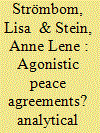

|
|
|
|
|
| Summary/Abstract |
Later years have seen the growth of a vibrant theoretical discussion on agonistic peace and the importance of creating space for contestation, plurality, and dissensus post-accord. However, there has been very few attempts at embedding agonistic theory in empirical analyses of peace agreements. This study attends to that lacuna by investigating how agonistic principles can be integrated and investigated in peace agreements. We suggest a threefold set of indicators for assessing the degree to which peace agreements are invested with agonistic dynamics: (1) what types of spaces for interaction are offered post-accord; (2) what forms of inclusion are stipulated; and (3) how is the peace agreement framed in terms of conflict termination and consensus/dissensus? We illustrate how the various indicators could be put into motion in concrete analyses applying them to examples from the Oslo Accords, the Belfast Agreement, and the Colombian Peace Agreement. Finally, we discuss four dilemmas and problematiques of integrating agonistic ideas in peace agreements; the issue of power, the mixing of agonistic and liberal ideals in peace agreements, the principle of ‘nothing is agreed until everything is agreed’ and the related double-edged potential of constructive ambiguity and finally the challenges of implementing peace agreements.
|
|
|
|
|
|
|
|
|
|
|
|
|
|
|
|
| 2 |
ID:
187030
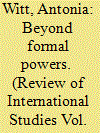

|
|
|
|
|
| Summary/Abstract |
International organisations (IOs) are said to command growing levels of authority. But in studying this phenomenon, scholars predominantly focus on the formal capacities member states assign to IOs. Much less attention is paid to the effects of IO authority, that is, how authority is exerted in practice and what it does within the affected societies. Based on a case study of the African Union's (AU) anti-coup regime, I make the case for a ‘bottom-up’ approach to IO authority, focusing on its localised enactment and effects. Analysing the AU's authority through a governmentality lens and drawing on several months of field research, I show that the AU's authority to govern coups is indeed effective: in commanding the re-establishment of constitutional order, the AU prescribes a particular imaginary of political order to resolve conflict and shapes the conduct of political actors in affected states by inscribing them into this order. But rather than operating in a top-down, direct way, the AU's authority is enacted in a distant, diffuse manner. Although based on formal powers assigned to the AU, neither the way this authority is exercised nor its effects can be inferred merely from these formal powers.
|
|
|
|
|
|
|
|
|
|
|
|
|
|
|
|
| 3 |
ID:
187032
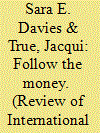

|
|
|
|
|
| Summary/Abstract |
The Women, Peace and Security (WPS) agenda and women's participation in peace processes are strongly supported by states. Yet financing to support the implementation of WPS has lagged behind overt international commitments to the agenda. WPS scholars and practitioners have highlighted the funding shortfalls for enabling WPS implementation and continued under-investment in gender-inclusive peace. In this article, we ask how much are donor states financially backing the implementation of gender-inclusive peace agreements which they promote? We use a high ambiguity-conflict model of policy implementation to explore the mechanisms of bilateral and multilateral financing for gender-inclusive peace. We trace to what extent international investments are supporting specific gender provisions in two progressive gender-inclusive peace processes, the 2016 Colombian Peace Agreement and 2015 Comprehensive Peace Agreement in the Philippines. In both case studies, we reveal a drastic gap between the international donor rhetoric and the funding. Patterns of financial investment do not follow nor support the life cycle of inclusive peace processes. We suggest key strategies for further research to address this policy and recommend that all gender provisions of peace agreements be monitored in-country and all gender-responsive investments be tracked and evaluated.
|
|
|
|
|
|
|
|
|
|
|
|
|
|
|
|
| 4 |
ID:
187036
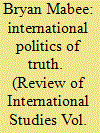

|
|
|
|
|
| Summary/Abstract |
C. Wright Mills's critical work on international relations is well known, but is often dismissed as being unscholarly, reductionist, and overly polemical. However, seeing the work in the context of his earlier career can allow for a new perspective, with Mills's activist views on war and militarism shaped very clearly by his earlier theoretical and political commitments. Mills developed a distinctive political sociological understanding of international politics, theorising the state as a historically-situated structural determinant of international power: a network of elite power that was contextualised by the influence of the socially constructed realities of the international created by elites. Mills's crucial critical contribution was to see the role of the intellectual as criticising these realities through the imaginative reconceptualisation of the world, which he called the ‘politics of truth’. The article argues the international politics of truth was not only Mills's distinctive theory of the international, but that it was clearly supported by his early theorisation of the international. A revised view of the importance of Mills's international relations work can help to situate Mills as part of a broader tradition of IR scholarship, a lost lineage of the critical historical and political sociology of the international.
|
|
|
|
|
|
|
|
|
|
|
|
|
|
|
|
| 5 |
ID:
187037


|
|
|
|
|
| Summary/Abstract |
Many theoretical approaches to cybersecurity adopt an anthropocentric conceptualisation of agency; that is, tying the capacity to act to human subjectivity and disregarding the role of the non-human in co-constructing its own (in)security. This article argues that such approaches are insufficient in capturing the complexities of cyber incidents, particularly those that involve self-perpetuating malware and autonomous cyber attacks that can produce unintentional and unpredictable consequences. Using interdisciplinary insights from the philosophy of information and software studies, the article counters the anthropocentrism in the cybersecurity literature by investigating the agency of syntactic information (that is, codes/software) in co-producing the logics and politics of cybersecurity. It specifically studies the complexities of codes/software as informational agents, their self-organising capacities, and their autonomous properties to develop an understanding of cybersecurity as emergent security. Emergence is introduced in the article as a non-linear security logic that captures the peculiar agential capacities of codes/software and the ways in which they challenge human control and intentionality by co-constructing enmity and by co-producing the subjects and objects of cybersecurity.
|
|
|
|
|
|
|
|
|
|
|
|
|
|
|
|
| 6 |
ID:
187029
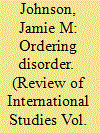

|
|
|
|
|
| Summary/Abstract |
This article offers insights into the character and composition of world order. It does so by focusing on how world order is made and revealed through seemingly disorderly events. We examine how societies struggle to interpret and respond to disorderly events through three modes of treatment: tragedy, crisis, and scandal. These, we argue, are the dominant modes of treatment in world politics, through which an account of disorder is articulated and particular political responses are mobilised. Specifically, we argue that each mode provides a particular way of problematising disorder, locating responsibility, and generating political responses. As we will demonstrate, these modes instigate the ordering of disorder, but they also agitate and reveal the contours of order itself. We argue, therefore, that an attentiveness to how we make sense of and respond to disorder offers the discipline new opportunities for interrogating the underlying forces, dynamics, and structures that define contemporary world politics.
|
|
|
|
|
|
|
|
|
|
|
|
|
|
|
|
| 7 |
ID:
187034
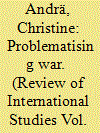

|
|
|
|
|
| Summary/Abstract |
This article redirects extant critiques of the modern problem of war at this problem's underlying logic of deviance. According to this logic, war constitutes a kind of international conduct that contravenes behavioural norms and that can be corrected through diagnostic and didactic means. Thereby, war is rendered into a problem falling within the scope of human agency. However, this agency rests on and reproduces this logic's constitutive blind spots. Therefore, it seems imperative to develop ways of problematising war otherwise. The article provides two starting points for (critical) IR scholarship seeking to undertake such a project. Firstly, it combines two Foucaultian tools, the concept of problematisation and the method of genealogy, to direct critique at the logics underlying our evaluative – analytical, ethical, and political – judgements. Secondly, it uses these tools to trace the contingent emergence of the logic of deviance in a crucial example within the wider genealogy of the problem of war: the Carnegie Endowment's commission of inquiry into the Balkan Wars of 1912 and 1913. Based on original archival research, I highlight different elements of this inquiry's problematisation of war – its frames, assumptions, ways of knowing, and subjects of knowledge – to make them available for reconstruction.
|
|
|
|
|
|
|
|
|
|
|
|
|
|
|
|
| 8 |
ID:
187035


|
|
|
|
|
| Summary/Abstract |
Scholarly interest in radical Islam is long-standing and crosses multiple disciplines. Yet, while the labelling of Islam and Muslim actors as ‘radical’ is extensive, this has not been interrogated as a particular scholarly practice. And while studies of non-Western radicalism have grown in recent years, cross-cultural analysis of radicalism as a particular concept in political thought has been neglected. This article aims to begin to address this question, with reference to radical Islam. By treating radicalism as a meta-concept, it identifies radical Islam as a malleable and composite category that is constituted by, and made legible through, conceptual properties associated with four discourses in the study of radicalism with origins in the Western academy: Euro-radicalism, identified with the European left and critical theory; fundamentalism; radicalisation; and liberalism. I argue that radical Islam is under-theorised and over-determined as a scholarly category. This can be explained by how concepts originating in the Western academy to address Western contexts and phenomena function as master frameworks, narratives, or pivots against or around which radical Islam is defined. This is the case even when Eurocentrism is contested by critical theorists who tend to reproduce it because they do not abandon Western conceptions of radicalism but rather draw on them. Academic accounts of radical Islam also authenticate Islam by advancing selective, strategic or apologetic descriptions of what constitutes radicalism. In these ways, critical scholarship, including within IR, can also be insufficiently attentive to marginal and heterodox voices that fall outside hegemonic conceptions of Islamic normativity.
|
|
|
|
|
|
|
|
|
|
|
|
|
|
|
|
| 9 |
ID:
187031
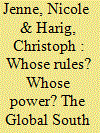

|
|
|
|
|
| Summary/Abstract |
International organisations reflect global power configurations and as such, are deemed to reproduce global inequalities. Nevertheless, they also represent opportunities for the Global South to challenge the global stratification of power, for instance by providing personnel to international agencies and bureaucracies. This article examines the role of leadership personnel from the Global South in implementing robust peacekeeping mandates.
Given that states from the Global South have often been hesitant to support the use of force internationally, can leadership positions in peace operations help these states to influence norms at the implementation level? We develop a conceptual understanding of individuals’ role in implementing norms and apply the framework to military force commanders from Brazil, India, and Rwanda. The analysis demonstrates that appointments provide an opportunity for norm contestation, but do not necessarily guarantee such influence. Under certain circumstances, we find that military force commanders can actually undermine their governments’ preferences. However, the relation between force commanders’ practices and their country of origin's policy stance is complex and influenced by a variety of different factors that merit further investigation.
|
|
|
|
|
|
|
|
|
|
|
|
|
|
|
|
|
|
|
|
|